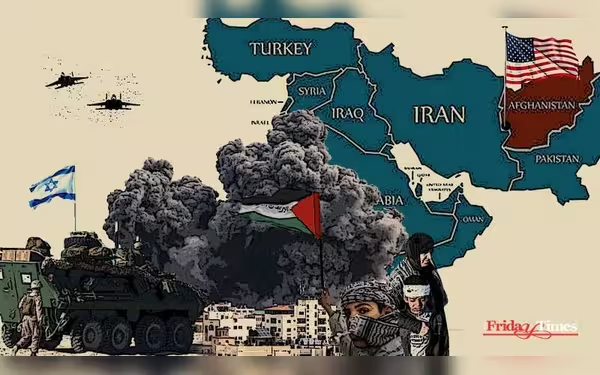Saturday, November 16, 2024 05:30 PM
One Year After October 7: The Ongoing Gaza Conflict
- Hamas attack on Israel led to unprecedented violence.
- Over 40,000 Palestinians have lost their lives since the attack.
- Netanyahu's military response escalated the humanitarian crisis in Gaza.
 Image Credits: thefridaytimes
Image Credits: thefridaytimesReflecting on the October 7 tragedy, the ongoing Gaza conflict has resulted in devastating casualties and a humanitarian crisis.
On October 7, 2022, a significant and tragic event unfolded when Hamas launched an attack on Israel, resulting in the deaths of 1,195 individuals, including 815 civilians. This attack was a desperate signal from Hamas, indicating that unless Israel ceased its long-standing blockade of Gaza, further violence would ensue. Hamas believed that this aggressive move would pave the way for the establishment of an independent Palestinian state. However, the attack caught Israel off guard, and the aftermath was far from what Hamas had anticipated.
In the wake of the attack, the United States quickly labeled it as Israel's "9/11" and rushed to support its ally. Hamas underestimated the ferocity of the Israeli response, particularly the resolve of Prime Minister Benjamin Netanyahu, who has been one of the most formidable leaders in Israel's history. Prior to October 7, Netanyahu was facing declining support at home, with regular protests against his leadership. He was also embroiled in corruption charges, which could have led to his downfall. However, the attack provided him with a renewed sense of purpose and a rallying point for his government.
Netanyahu, often described as ruthless and cunning, shifted the narrative away from accountability for the attack. Instead, he launched a massive military operation in Gaza, claiming that the Israeli Defense Forces were the "most moral army in the world." This operation was marked by unprecedented violence, with airstrikes targeting buildings suspected of housing Hamas fighters. Tragically, this included schools, hospitals, and residential areas, leading to widespread destruction and displacement of over one million people.
The humanitarian crisis in Gaza escalated dramatically. Water and energy supplies were cut off, and food deliveries were severely restricted. As the world watched in horror, public sentiment began to shift. Israel, once seen as a victim, was increasingly viewed as the aggressor. Despite numerous United Nations meetings condemning Israel's actions, the United States and several Western nations continued to block resolutions aimed at holding Israel accountable.
As the conflict continued, Netanyahu's government faced criticism from various quarters, yet he remained steadfast in his approach. The situation further deteriorated as violence spilled over into the West Bank and beyond, with Israeli settlers attacking Palestinians and Hezbollah launching strikes from Lebanon. The cycle of violence seemed unending, with each side retaliating against the other.
In just one year since the attack, the toll has been devastating. Over 40,000 Palestinians have lost their lives, including countless innocent children and women. The number of wounded exceeds 100,000, and millions are grieving the loss of loved ones. This catastrophe raises critical questions about the future of peace in the region. While Hamas bears responsibility for initiating the conflict, the actions of Netanyahu and the Israeli military cannot be overlooked.
As we reflect on the events of October 7 and their aftermath, it is essential to recognize the complexity of the situation. The cycle of violence and retaliation has only deepened the wounds on both sides. Moving forward, it is crucial for leaders to seek dialogue and understanding rather than perpetuating a cycle of hatred and destruction. The hope for a peaceful resolution lies in the willingness of both parties to engage in meaningful conversations that prioritize human rights and dignity for all. Only then can we hope to break the cycle of violence and pave the way for a brighter future for both Israelis and Palestinians.













